Strategic Planning to Improve Creativity Using Artificial Intelligence for Islamic University of Minnesota Students USA
Abstract
This paper is to investigate how artificial intelligence may be used to boost strategic planning and creativity among students at the Islamic University in Minnesota, USA. In view of the fast developments in the educational and technical sectors, the study concentrated on evaluating how far AI technologies may improve students' strategic thinking abilities and academic creativity. The researcher used the descriptive analytical technique as the most suitable instrument for this kind of research as it enables methodical data analysis to grasp the reality of AI application in higher education. Randomly chosen to reflect the target group, 100 male and female students from the Islamic University in Minnesota made up the study sample. The data collecting instrument was a validated questionnaire created by the researchers comprising various parts assessing the key study variables: artificial intelligence, strategic planning, and creativity. The findings of the study showed a statistically significant favorable effect of applying AI instrument s on enhancing students' strategic planning skills. The results also showed that by offering dynamic and innovative-stimulating learning settings, artificial intelligence helps to improve students' creative abilities. The research also revealed no notable variations between men and women in terms of using artificial intelligence for creative and strategic planning. The findings led the researcher to advise universities to include artificial intelligence technologies into their courses and to train students to utilize them efficiently. The study underlined as well the need of creating educational policies in line with digital transformation and improving the results of higher education in the framework of the world knowledge economy.
Downloads
Copyright (c) 2025 (Humanities, social and applied sciences) Misan Journal of Academic Studies

This work is licensed under a Creative Commons Attribution-NonCommercial-NoDerivatives 4.0 International License.
The copyright is also the copyright of the magazine only.
All articles published in our magazine are subject to license terms
Creative Commons Attribution(CC BY-NC-ND 4.0) This license permits the content to be reproduced, redistributed and reused in whole or in part for any purpose free of charge, without any permission from the author(s), researcher or student.
Works submitted to Maysan Journal of Academic Studies for publication in the journal (CC BY-NC-ND 4.0) license terms. Where available content can be shared, distributed and replicated provided there is no commercial profit and appropriate credit must be given to the original source through sources or citations. It is mandatory to review any material used from other sources including shapes, tables, and images for re-use under the terms of the Creative Commons License (CC BY-NC-ND 4.0).Provided that there is no modification to the original content



